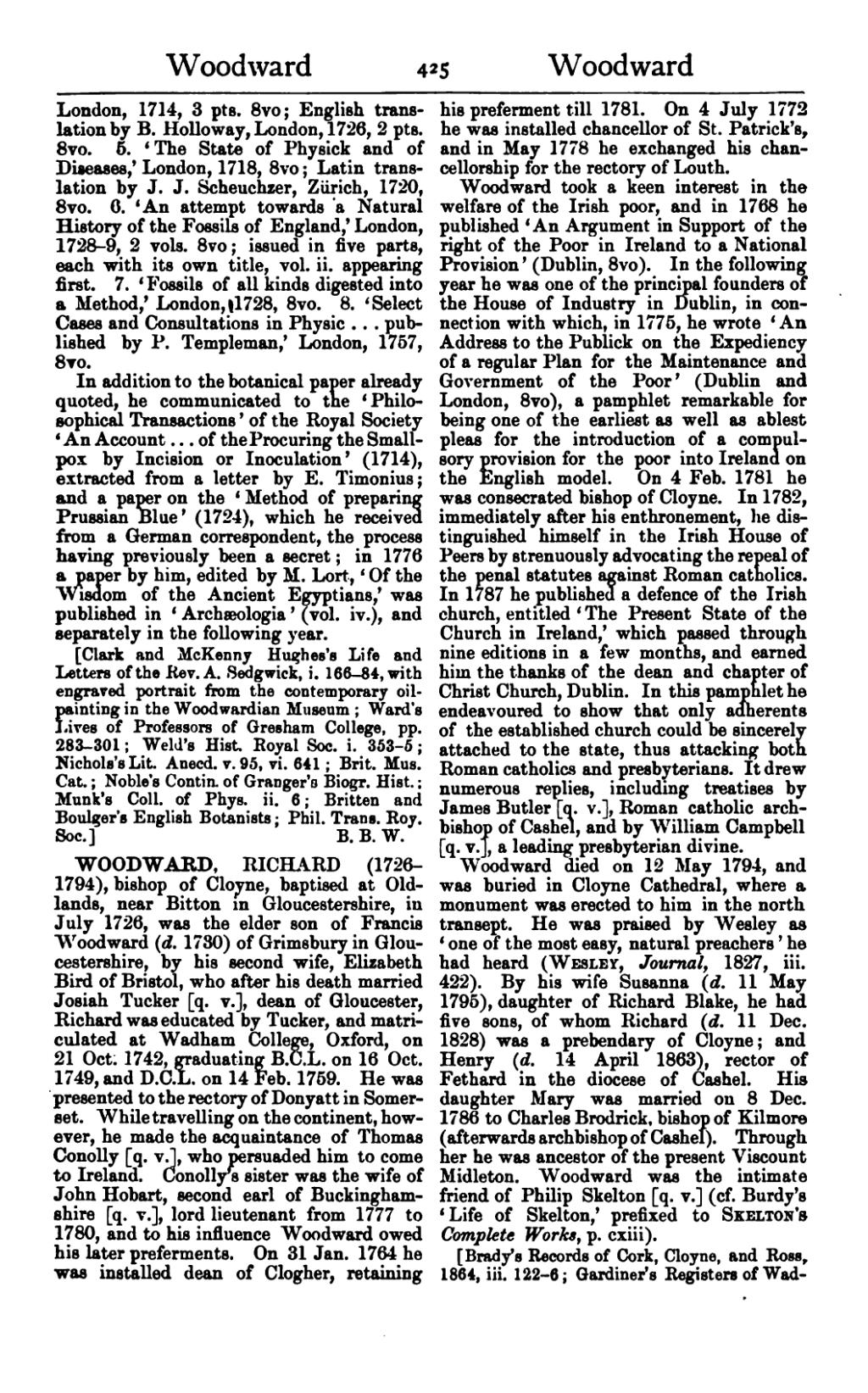- London, 1714, 3 pts. 8vo; English translation by B. Holloway, London, 1726, 2 pts. 8vo.
- ‘The State of Physick and of Diseases,’ London, 1718, 8vo; Latin translation by J. J. Scheuchzer, Zürich, 1720, 8vo.
- ‘An attempt towards a Natural History of the Fossils of England,’ London, 1728–9, 2 vols. 8vo; issued in five parts, each with its own title, vol. ii. appearing first.
- ‘Fossils of all kinds digested into a Method,’ London, 1728, 8vo.
- ‘Select Cases and Consultations in Physic … published by P. Templeman,’ London, 1757, 8vo.
In addition to the botanical paper already quoted, he communicated to the ‘Philosophical Transactions’ of the Royal Society ‘An Account … of the Procuring the Smallpox by Incision or Inoculation’ (1714), extracted from a letter by E. Timonius; and a paper on the ‘Method of preparing Prussian Blue’ (1724), which he received from a German correspondent, the process having previously been a secret; in 1776 a paper by him, edited by M. Lort, ‘Of the Wisdom of the Ancient Egyptians,’ was published in ‘Archæologia’ (vol. iv.), and separately in the following year.
[Clark and McKenny Hughes's Life and Letters of the Rev. A. Sedgwick, i. 166–84, with engraved portrait from the contemporary oil-painting in the Woodwardian Museum; Ward's Lives of Professors of Gresham College, pp. 283–301; Weld's Hist. Royal Soc. i. 353–5; Nichols's Lit. Anecd. v. 95, vi. 641; Brit. Mus. Cat.; Noble's Contin. of Granger's Biogr. Hist.; Munk's Coll. of Phys. ii. 6; Britten and Boulger's English Botanists; Phil. Trans. Roy. Soc.]
WOODWARD, RICHARD (1726–1794), bishop of Cloyne, baptised at Oldlands, near Bitton in Gloucestershire, in July 1726, was the elder son of Francis Woodward (d. 1730) of Grimsbury in Gloucestershire, by his second wife, Elizabeth Bird of Bristol, who after his death married Josiah Tucker [q. v.], dean of Gloucester. Richard was educated by Tucker, and matriculated at Wadham College, Oxford, on 21 Oct. 1742, graduating B.C.L. on 16 Oct. 1749, and D.C.L. on 14 Feb. 1759. He was presented to the rectory of Donyatt in Somerset. While travelling on the continent, however, he made the acquaintance of Thomas Conolly [q. v.], who persuaded him to come to Ireland. Conolly's sister was the wife of John Hobart, second earl of Buckinghamshire [q. v.], lord lieutenant from 1777 to 1780, and to his influence Woodward owed his later preferments. On 31 Jan. 1764 he was installed dean of Clogher, retaining his preferment till 1781. On 4 July 1772 he was installed chancellor of St. Patrick's, and in May 1778 he exchanged his chancellorship for the rectory of Louth.
Woodward took a keen interest in the welfare of the Irish poor, and in 1768 he published ‘An Argument in Support of the right of the Poor in Ireland to a National Provision’ (Dublin, 8vo). In the following year he was one of the principal founders of the House of Industry in Dublin, in connection with which, in 1775, he wrote ‘An Address to the Publick on the Expediency of a regular Plan for the Maintenance and Government of the Poor’ (Dublin and London, 8vo), a pamphlet remarkable for being one of the earliest as well as ablest pleas for the introduction of a compulsory provision for the poor into Ireland on the English model. On 4 Feb. 1781 he was consecrated bishop of Cloyne. In 1782, immediately after his enthronement, he distinguished himself in the Irish House of Peers by strenuously advocating the repeal of the penal statutes against Roman catholics. In 1787 he published a defence of the Irish church, entitled ‘The Present State of the Church in Ireland,’ which passed through nine editions in a few months, and earned him the thanks of the dean and chapter of Christ Church, Dublin. In this pamphlet he endeavoured to show that only adherents of the established church could be sincerely attached to the state, thus attacking both Roman catholics and presbyterians. It drew numerous replies, including treatises by James Butler [q. v.], Roman catholic archbishop of Cashel, and by William Campbell [q. v.], a leading presbyterian divine.
Woodward died on 12 May 1794, and was buried in Cloyne Cathedral, where a monument was erected to him in the north transept. He was praised by Wesley as ‘one of the most easy, natural preachers’ he had heard (Wesley, Journal, 1827, iii. 422). By his wife Susanna (d. 11 May 1795), daughter of Richard Blake, he had five sons, of whom Richard (d. 11 Dec. 1828) was a prebendary of Cloyne; and Henry (d. 14 April 1863), rector of Fethard in the diocese of Cashel. His daughter Mary was married on 8 Dec. 1786 to Charles Brodrick, bishop of Kilmore (afterwards archbishop of Cashel). Through her he was ancestor of the present Viscount Midleton. Woodward was the intimate friend of Philip Skelton [q. v.] (cf. Burdy's ‘Life of Skelton,’ prefixed to Skelton's Complete Works, p. cxiii).
